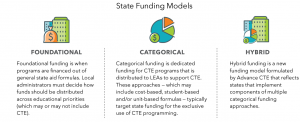This week, Congress returned for continued work during the lame duck session while a recent workforce development agreement is considered by lawmakers. Elsewhere, the Office of Management and Budget (OMB) opened the public comment period on the Department of Education’s (ED) recently proposed information collection requests, ED issued guidance for supporting the educator workforce, and the Department of Labor (DOL) withdrew a proposed rulemaking on apprenticeships.
Congress Returns for Lame Duck Session
 Following the Thanksgiving holiday recess period, lawmakers in both chambers returned to Capitol Hill this week for the final stretch of the 118th Congress. Lawmakers are widely expected to address a number of “must pass” legislative items, including and especially the pressing need to determine a pathway forward for fiscal year 2025 (FY25) appropriations before current funding expires later this month. As a reminder, current FY24 funding levels were extended earlier this fall through December 20 for all federal programs, including the Carl D. Perkins Career and Technical Education Act (Perkins V). Lawmakers are likely to pass another short-term extension, known as a continuing resolution, through the early part of next year.
Following the Thanksgiving holiday recess period, lawmakers in both chambers returned to Capitol Hill this week for the final stretch of the 118th Congress. Lawmakers are widely expected to address a number of “must pass” legislative items, including and especially the pressing need to determine a pathway forward for fiscal year 2025 (FY25) appropriations before current funding expires later this month. As a reminder, current FY24 funding levels were extended earlier this fall through December 20 for all federal programs, including the Carl D. Perkins Career and Technical Education Act (Perkins V). Lawmakers are likely to pass another short-term extension, known as a continuing resolution, through the early part of next year.
This means resolving final FY25 appropriations for federal programs, like those authorized by Perkins V and others falling under the purview of the U.S. Department of Education (ED) and Labor (DOL), will be determined by the new, Republican-controlled Congress next year. As these efforts continue to progress, Advance CTE is continuing to advocate for strengthened federal investments in Perkins V’s state grant program and other critical sources of federal support for Career Technical Education (CTE).
WIOA Agreement Under Consideration
Just before Thanksgiving, the leaders of the House Education and the Workforce Committee and the Senate Health, Education, Labor, and Pensions (HELP) Committee announced that they had reached a bicameral and bipartisan agreement to reauthorize the Workforce Innovation and Opportunity Act (WIOA). If enacted, the legislation would codify the Strengthening Community College Training Grant Program and the Workforce Data Quality Initiative– two key priorities for Advance CTE. In addition, the legislation would make improvements to the sharing of one-stop center infrastructure costs while also updating youth formula funding to serve learners more effectively. The legislation is currently being considered by the Senate via a “hotline” process, which requires the agreement of the full Senate. Advance CTE is monitoring these efforts closely and continuing to analyze the bill for additional areas of alignment with the organization’s board-approved WIOA recommendations. Read a summary of the bill here.
Comment Period Continues for ED’s Perkins Regulatory Proposal
At the beginning of the week, the U.S. Department of Education’s (ED) proposed information collection requests (ICRs) impacting the Perkins V state plan guide and consolidated annual report were moved for review to the Office of Management and Budget (OMB). After the first comment window, ED was responsible for reviewing comments submitted by public stakeholders and considering the impact of the ICRs on the burden on state CTE systems. Given ED’s extremely quick processing and review of comments from last month, it remains unclear if the agency has thoughtfully assessed the impact of this proposal prior to advancing it for a new 30-day review period by OMB. Submission of comments for the State Plan Guide and the Consolidated Annual Report (CAR) Guide as part of the OMB review process are due by January 2, 2025. Advance CTE encourages state leaders and other CTE leaders to communicate concerns to OMB regarding the accuracy of ED’s estimates regarding the proposal’s burden on state and local CTE systems.
ED Releases Non-Regulatory Guidance Resources
This week, the Department of Education (ED) released two non-regulatory guidance resources. The first is guidance on strategically using Title II, Part A funds under the Elementary and Secondary Education Act (ESEA) to support educator recruitment, retention, professional learning, and improved student outcomes. Otherwise known as Supporting Effective Instruction State Grants, they can be used at the discretion of state and local education agencies for any means identified to increase student achievement. The guidance references policy levers that education agencies could pull including expanding pathways into the profession and combining funds with other grants from the Individuals with Disabilities Education Act (IDEA) and Perkins V.
The second resource is guidance from ED for state and local education agencies and institutions of higher education to support the development of a diverse educator workforce. The guidance references the importance of a diverse educator workforce in improving student outcomes, addressing teacher shortages, and fostering equity in education. In the resource, ED cites the investment in Grow Your Own programs as an important pathway into the educational workforce. Delaware’s Teacher Academy Career Pathway program is upheld as an example of engaging secondary learners in meaningful teaching training through a program of study that offers college credits and work-based learning opportunities to grow the educator workforce in their state.
DOL Withdraws Apprenticeship Rule
Over the Thanksgiving holiday, the U.S. Department of Labor (DOL) formally withdrew a proposed rulemaking on National Apprenticeship System. Proposed nearly a year ago, the rule would have created a new apprenticeship model called “Career and Technical Education Apprenticeships,” which Advance CTE and others raised concerns about during the comment period. The withdrawal of this rule means that existing apprenticeship regulations governing Registered Apprenticeship Programs will stay in effect for the time being.
Rob Young, Communications & Advocacy Associate
Steve Voytek, Policy Advisor


 Steve Voytek, Policy Advisor
Steve Voytek, Policy Advisor  Lawmakers Include Focus on Appropriations and WIOA in Next Work Period
Lawmakers Include Focus on Appropriations and WIOA in Next Work Period 
 Administration of a CTE program with an equity lens begins with ensuring all learners have meaningful access to and substantial engagement in high-quality CTE programming which requires making these actions a priority. Ohio has created and applied equity-minded leadership principles within
Administration of a CTE program with an equity lens begins with ensuring all learners have meaningful access to and substantial engagement in high-quality CTE programming which requires making these actions a priority. Ohio has created and applied equity-minded leadership principles within  The application of equity-minded principles isn’t a one-time occurrence. It requires an ongoing systematic review of policies, practices and data to determine the effectiveness of the mitigating or transformational strategies being applied. Indiana engaged in this process by conducting a review of the CTE equity labs being offered in their state and using additional resources to measure goal attainment and to provide additional supports to local leaders.
The application of equity-minded principles isn’t a one-time occurrence. It requires an ongoing systematic review of policies, practices and data to determine the effectiveness of the mitigating or transformational strategies being applied. Indiana engaged in this process by conducting a review of the CTE equity labs being offered in their state and using additional resources to measure goal attainment and to provide additional supports to local leaders. 
